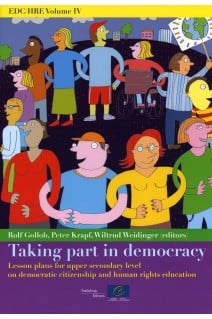



This is a manual for teachers in Education for Democratic Citizenship (EDC) and Human Rights Education (HRE), EDC/HRE textbook editors and curriculum developers. Nine teaching units of approximately four lessons each focus on key concepts of EDC/HRE. The lesson plans give step-by-step instructions and include student handouts and background information for teachers. In this way, the manual is suitable for trainees or beginners in the teaching profession and teachers who are receiving in-service teacher training in EDC/HRE. Experienced teachers may draw on the ideas and materials. The complete manual provides a full school year's curriculum for students in upper secondary school (grades 10 to 12), but as each unit is also complete in itself, the manual allows great flexibility of use.The objective of EDC/HRE is the active citizen who is willing and able to participate in the democratic community. Therefore, EDC/HRE strongly emphasises action and task-based learning. This manual for upper secondary level focuses on key competences that enable young people to participate in democratic decision making and to meet the challenges of a dynamic pluralist society. Key concepts of EDC/HRE are taught as tools of lifelong learning.
Introduction
1. What does this manual offer? - A brief outline
2. What is EDC/HRE? - The three dimensions of EDC/HRE
2.1 The cognitive dimension of EDC/HRE: learning about democracy and human rights
2.2 The participative dimension of EDC/HRE: learning for democracy and human rights
2.3 The cultural dimension of EDC/HRE: learning through democracy and human rights
3. The conceptual framework of this manual - the three "Cs" in EDC/HRE (Challenges, Constructivism, Competencies)
4. The "European approach" to EDC/HRE
Key to the symbols used in the text
Interactive constructivist learning in EDC/HRE
1. Key questions on didactics in EDC/HRE
2. An example of interactive constructivist learning - young pupils imagine their ideal world
3. Every person learns differently -- "We create the world in our minds"
4. Constructivist learning and social interaction
5. What is the teacher's role in processes of constructivist learning?
6. What is the teacher's role in EDC/HRE?
6.1 The teacher as lecturer and instructor - to support and enrich construction
6.2 The teacher as critic and corrector - to support deconstruction
6.3 The teacher as creator and provider of application tasks - to support reconstruction
6.4 The teacher as chair in plenary sessions - to support all forms of constructivist learning
7. Democracies as communities of learners - a constructivist approach to the key concepts in EDC/HRE
Part 1 -Taking part in the community
Unit 1: Identity. Making choices. We shape our lives, and other people's too
Unit 2: Responsibility. Taking part, taking responsibility. Liberty carries responsibilities
Unit 3: Diversity and pluralism. Consent through dissent? How do we agree on the common good?
Part 2 - Taking part in politics: settling conflict, solving problems
Unit 4: Conflict. The fishing conflict. How can we solve the sustainability dilemma?
Unit 5: Rules and law. What rules serve us best? A decision-making game
Unit 6: Government and politics. The policy cycle model. How does a democratic community solve its problems?
Unit 7: Equality. Majority rule - a fair rule? How can we settle the majority/minority issue
in democracy?
Part 3 - Taking part in politics: participation through communication
Unit 8: Liberty. Debating in public. Why doesn't freedom (of speech) work without strict rules?
Unit 9: The media. Taking part in democracy through the media. The producers and users of media as gatekeepers and agenda setters
Manual for students with student handouts
Download an extract (1000)

This is a manual for teachers in Education for Democratic Citizenship (EDC) and Human Rights Education (HRE), EDC/HRE textbook editors and curriculum developers. Nine teaching units of approximately four lessons each focus on key concepts of EDC/HRE. The lesson plans give step-by-step instructions and include student handouts and background information for teachers. In this way, the manual is suitable for trainees or beginners in the teaching profession and teachers who are receiving in-service teacher training in EDC/HRE. Experienced teachers may draw on the ideas and materials. The complete manual provides a full school year's curriculum for students in upper secondary school (grades 10 to 12), but as each unit is also complete in itself, the manual allows great flexibility of use.The objective of EDC/HRE is the active citizen who is willing and able to participate in the democratic community. Therefore, EDC/HRE strongly emphasises action and task-based learning. This manual for upper secondary level focuses on key competences that enable young people to participate in democratic decision making and to meet the challenges of a dynamic pluralist society. Key concepts of EDC/HRE are taught as tools of lifelong learning.
Please note that in accordance with our terms & conditions, PDF/epubs may only be purchased by private individuals.
